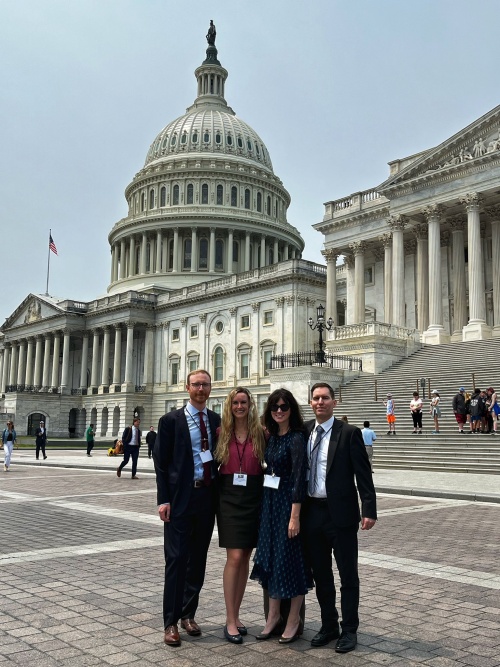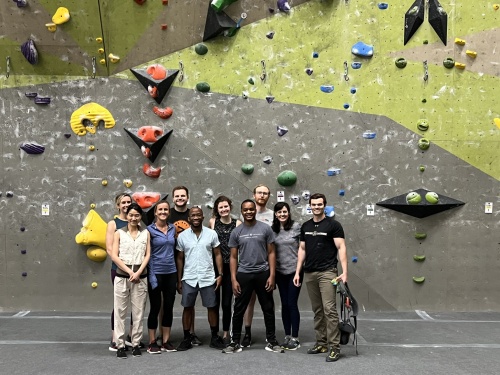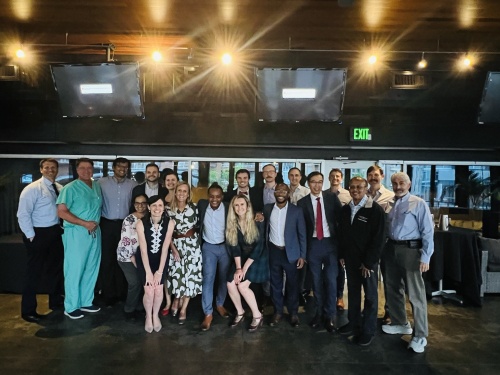We are pleased that you are interested in the radiation oncology residency program at Vanderbilt University Medical Center. We are committed to providing quality graduate medical education for tomorrow's radiation oncologists. VUMC offers a teaching facility with diverse disease pathologies, state-of-the art technology, cutting edge research, and outstanding faculty.

Learn More About Our Program
Navigate the below links for more information on our program's:
Clinical Education & Didactics
- Residents spend approximately 36 of their 48 months of training rotating through the various clinical services. Rotations change every two months. All rotations are completed at the main campus, including pediatrics and brachytherapy.
- Residents attend daily didactic sessions for clinical didactics, physics and radiation biology. Additional educational sessions include multidisciplinary tumor boards, departmental chart rounds, morbidity and mortality conferences, visiting professorship lectures and more. Residents are invited to participate in mock oral board examinations yearly with our alumni.
- For more information, click here.
- All residents are provided with 12 months of consecutive research/elective time. Many of our residents apply for The Holman Pathway which is designed for the exceptional trainee who has both strong clinical abilities and a background in research. If accepted for this program residents spend 18 months performing research.
- Twelve months of consecutive research / elective time available also facilitates completion of additional degrees (e.g. MBA, MS in Clinical Investigation, MA in Bioethics, MPH) for interested residents. Electives can also be used to spend time in Radiology, Pathology, Medical Oncology or surgical subspecialties. Electives can also be used for the optional rotation in Inpatient / Palliative Radiation with Dr. Kohutek, or a proton therapy away rotation.
- For more information, click here.
- Watch here as some of our alumni share about their experiences as radiation oncology residents at VUMC.
VUMC Graduate Medical Education Office
Additional VUMC Virtual Tour Videos
Application requirements
Individuals applying for residency in radiation oncology must hold a medical degree from an accredited institution. We are a 4-year training program accredited by the Accreditation Council for Graduate Medical Education (ACGME). All applicants must have completed a minimum of an internship, at an accredited institution, prior to beginning their PGY-2 year with us. Written documentation of successful completion of the PGY-1 year is required. If you hold a foreign medical degree, a valid certificate from the Educational Commission for Foreign Medical Graduates (ECFMG) is also required. The Administrative Director for GME at Vanderbilt is the designated Training Program Liaison for ECFMG Graduates. A Complete Application to the Radiation Oncology training program must include a Medical Student Performance Evaluation (MSPE), curriculum vitae, letters of recommendation, personal statement, medical school transcript, and USMLE transcript. Completion of USMLE Step 1 prior to application is required, and completed USMLE Step 2 is strongly encouraged.
We accept applications through the Electronic Residency Application Service (ERAS). We participate in the National Residency Matching Program (NRMP).
VUMC GME does not sponsor O-1 visa. VUMC Radiation Oncology does not offer H1-B visa sponsorship or accept J-1 visas.
Vanderbilt is committed to fostering an environment where everyone has the chance to thrive and is committed to the principles of equal opportunity. EOE/Vets/Disabled.
Vanderbilt offers excellent benefits for all employees. A partial listing of benefits can be viewed on our website. On acceptance to our program all residents must successfully pass reference and background screenings.
Interviews
Planned interview dates are 11/11/25, 11/20/25, 12/3/25, 12/17/25, and 1/9/26, and will be held in-person in Nashville, with one night of hotel accommodation paid for the night prior to the interview. We will have a quota of 2 residents for entering at the PGY-2 level in July 2027.
Questions? Contact Us
Program Director: Dr. Natalie A Lockney, natalie.lockney@vumc.org
Program Coordinator: Shannon Lewis, shannon.l.lewis@vumc.org
Return to the main Residency Program page




